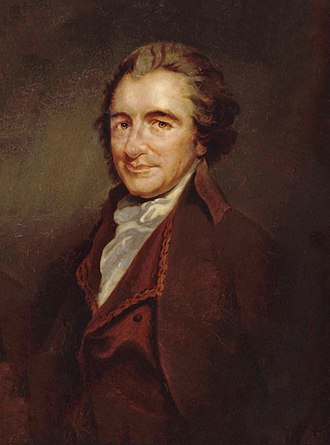“In free countries the Law ought to be the King”
For Independence Day I’m going back before the Declaration to a text published at the end of 1775 which paved the way for blaming everything on King George III.
These passages are from Thomas Paine’s Common Sense, advocating both independence from Britain and a republican form of government—meaning he set out to convince people who had lived under a monarch their whole lives that that figure wasn’t necessary.
These passages are from Thomas Paine’s Common Sense, advocating both independence from Britain and a republican form of government—meaning he set out to convince people who had lived under a monarch their whole lives that that figure wasn’t necessary.
The powers of governing still remaining in the hands of the king, he will have a negative [i.e., veto] over the whole legislation of this continent. And as he hath shewn himself such an inveterate enemy to liberty, and discovered such a thirst for arbitrary power; is he, or is he not, a proper man to say to these colonies, You shall make no laws but what I please?When Paine republished Common Sense in London in 1791, some lines in these passages still constitutied lese-majeste. The printer left blank spaces at those spots instead. In the copy scanned for Google Books, someone has gone through and inserted the original text by hand.
And is there any inhabitant in America so ignorant, as not to know, that according to what is called the present constitution, that this continent can make no laws, but what the king gives leave to: and is there any man so unwise, as not to see, that (considering what has happened) he will suffer no law to be made here, but such as suits his purpose? . . .
BUT where, say some, is the King of America? I will tell you, friend, he reigns above, and does not make havock of mankind like the Royal Brute of Great Britain. Yet that we may not appear to be defective even in earthly honours, let a day be solemnly set apart for proclaiming the charter; let it be brought forth, placed on the divine law, the word of God; let a crown be placed thereon, by which the world may know, that so far we approve of monarchy, that in America, THE LAW IS KING.
For as in absolute governments the King is Law, so in free countries the Law ought to be the King; and there ought to be no other. But left any ill use should afterwards arise, let the crown, at the conclusion of the ceremony, be demolished, and scattered among the people, whose right it is.
A GOVERNMENT of our own is our natural right; and when a man seriously reflects on the precariousness of human affairs, he will become convinced, that it is infinitely wiser and safer, to form a constitution of our own in a cool deliberate manner, while we have it in our power, than to trust such an interesting event to time and chance. If we omit it now, some Massanello may hereafter arise, who, laying hold of popular disquietudes, may collect together the desperate and the discontented, and by assuming to themselves the powers of government, may sweep away the liberties of the continent like a deluge.


No comments:
Post a Comment